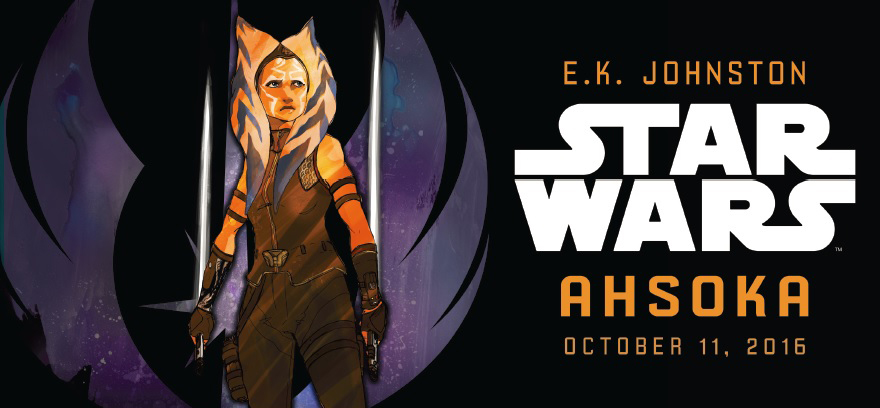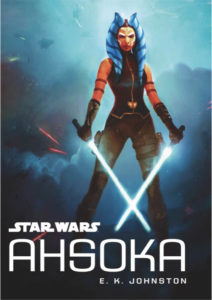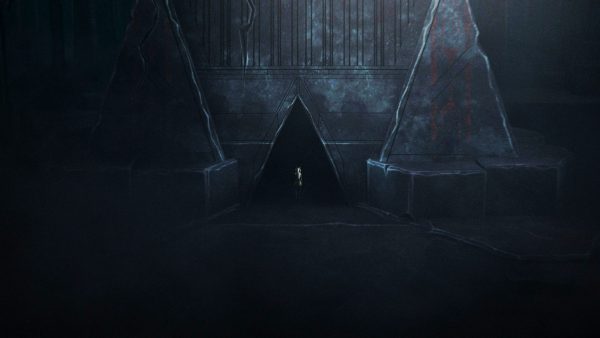Ever since Ahsoka Tano walked into the sunset in the season five finale of The Clone Wars, I’ve hoped for a novel or a comic series detailing her post-Jedi existence. The release of Darth Maul: Son of Dathomir and Dark Disciple, a comic and a book, respectively, based on storied intended to be The Clone Wars story arcs, heightened my anticipation. Fortunately, right on the heels of the Rebels season two finale — which showed Ahsoka once again striding away from the camera into an uncertain future — we got the announcement that everyone’s favorite Togruta Padawan would indeed be getting her own novel. Heightening the excitement was the later announcement that the voice of Ahsoka herself, Ashley Eckstein, would be performing the audiobook.
To the jump!
Let’s talk about what Ahsoka isn’t before we discuss what it is. It is not the untold, hinted-at story of Ahsoka’s final mission with Anakin Skywalker, immediately prior of Revenge of the Sith. Nor is it a sprawling fifteen-year epic covering the entire span of time between The Clone Wars and Rebels. Unfortunately, it is also not entirely a smaller, more personal story for Ahsoka. Indeed, if anything, Ahsoka tries to be a little of all these things, and winds up not doing any of them as well as it could have.
This is not to say Ahsoka is a disappointment, or not worth your time. It’s an extremely enjoyable novel. E.K. Johnston, author of a half dozen or so YA fantasy novels, has a sharp, clean prose style that’s ideal for the audiobook format. She’s obviously well-versed in Star Wars lore, and only very occasionally starts to drift into Kevin J. Anderson “here is a reference for the sake of a reference and to prove to you that I am as big a fan as you are” territory. For the most part, her references are grounded and feel like an organic part of the narrative. What’s more, her grasp on Ahsoka’s character is as sound as if Dave Filoni or Eckstein herself had written the book. Fans of the character will be pleased; Ahsoka is Ahsoka, and I could easily imagine I wasn’t listening to a novel but actually watching an episode of The Clone Wars.
Doubtless some of this impression came from the fact that I was listening to Ahsoka Tano herself, Ashley Eckstein, narrate the novel. Eckstein was the logical choice for this job, and she mostly performs her duties as narrator admirably. However, I believe this is Eckstein’s first time narrating an audiobook, and it occasionally shows. In small ways — mostly odd choices in pacing and emphasis. There’s also the fact that her male voices sound humorously like a child trying to imitate an adult. Then there’s her decision to voice all the Imperials as moustache-twirling cartoon villains. The new canon’s done an admirable job painting most Imperials not as evil, but simply as people doing what they think is best — either for the galaxy, or themselves. Johnston’s prose supports this, with interludes featuring a mid-level Imperial bureaucrat literally tallying life and death on a spreadsheet. He’s meant to be bland — and therefore terrifying in his blandness — but Eckstein’s reading makes him sound as if he’s about to start tying helpless maidens to train tracks, however, and it spoils the effect.
These are relatively minor complaints, however, as Eckstein’s performance is for the most part wonderful. Her pronunciation and diction are crisp and clear, and it’s always a pleasure to hear Ahsoka’s words in Eckstein’s voice. Where Eckstein really shines, however, is in the emotional tenor of her reading. Ahsoka is obviously a character Eckstein is deeply invested in, and this comes across in the narration in stark, powerful tones. Eckstein’s voice trembles with despair and soars with joy, and it never feels contrived or performative. Her emotional investment both in the character and in this performance are powerful and remarkable, and make the audiobook a wonderful listening experience. I genuinely hope Ashley Eckstein narrates more audiobooks in the future, even non-Star Wars ones. Minor quibbles aside, she’s obviously well-suited to it.
Eckstein’s performance can’t completely cover up the basic structural issues in the novel, unfortunately. The story begins a year (to the day) after Palpatine’s rise to power, with Ahsoka hiding out in the Outer Rim. All she’s trying to do is stay unnoticed, keep one step ahead of the Empire’s expansion, not get involved in any local politics, and above all else, never use the Force. You can imagine how well those plans go, of course, but the first half of the novel sets the stage for a much more local and limited scope than I might have expected from the novel.
Unfortunately, once I’d realized this and adjusted my expectations accordingly, the novel opens up somewhat in the latter half, bringing in a wider array of characters (some new, some familiar) and widening the scope considerably. It’s a wonky structure that tries to do both things — tell a small, intimate, personal story for Ahsoka, and detail the initial founding of the Rebellion — and in trying to do so, fails to completely succeed at either. Given the option between one or the other, and especially considering the novel’s relatively short length, I think I would have preferred if Johnston has kept things as small-scale as possible. In trying to do both, Johnston sacrifices some of the more personal elements of Ahsoka’s story, and in a weird way, makes it seem as if nothing much else of consequence happened in the 14 or so years between Ahsoka and Rebels. As it is, there’s suggestions of stories in both halves of the novel — a hint of romance in the personal story, and an encounter with the Black Sun in the wider tale — which go nowhere. It’s especially puzzling in the former case — a possibility of romance is set up almost immediately, but it sits on the mantle like a defective Chekhov’s gun, never going off but only kind of fizzling out at the end. It’s the equivalent of a film where characters share meaningful looks, but because their subplot was cut in the editing room, it never goes anywhere. Confusing, and frustrating.
 The novel also suffers from the lack of a major, consistent antagonist. At first we get the sense that the aforementioned bureaucrat will be our main villain, but that turns out to not be the case. Other antagonists come and go even more quickly. Indeed, the villains shift with the novel’s scope; as the story widens, the bureaucrat drops out and is replaced with a much larger, scarier bad guy. But because we spend so little time with this new antagonist, we’re not particularly invested in his struggle (such as it is) with Ahsoka. As a result of all this, the story — the back half, especially — can lack focus, and the climax winds up feeling a little anti-climactic.
The novel also suffers from the lack of a major, consistent antagonist. At first we get the sense that the aforementioned bureaucrat will be our main villain, but that turns out to not be the case. Other antagonists come and go even more quickly. Indeed, the villains shift with the novel’s scope; as the story widens, the bureaucrat drops out and is replaced with a much larger, scarier bad guy. But because we spend so little time with this new antagonist, we’re not particularly invested in his struggle (such as it is) with Ahsoka. As a result of all this, the story — the back half, especially — can lack focus, and the climax winds up feeling a little anti-climactic.
Don’t let these complaints fool you — I do wish Johnston had focused on doing one thing very well, and not two things pretty okay. But Ahsoka is immensely enjoyable, and well worth your time and money. Additionally, I can heartily recommend the audiobook version of this novel. My minor complaints aside, Ashley Eckstein does a fantastic job narrating the book. And while the production’s sound effects and musical cues do make things a little more melodramatic than is strictly necessary, they seem to be used more judiciously than they were in Life Debt. Likewise, the mix is much cleaner than the one on Life Debt; there, I often had trouble hearing the narrator’s voice over all the sound effects and music. Not the case here; Eckstein’s narration remained audible and understandable throughout.
Ahsoka the novel is a delightful addition to the Star Wars canon, and I can’t think of a better way to experience it than through Eckstein’s narration.
Note: A review copy of this audiobook was provided by Penguin Random House




